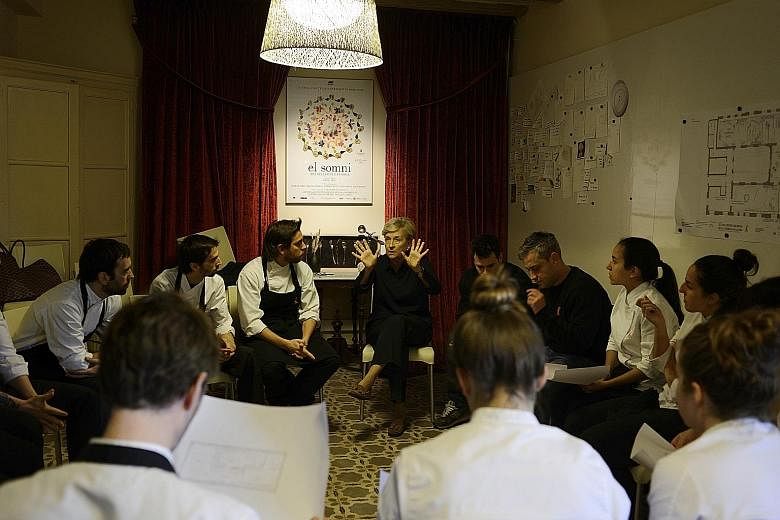GIRONA (Spain) • After more than 30 years in business, El Celler de Can Roca has a lot to boast about: three Michelin stars, an attention- grabbing menu that works in contemporary twists on traditional Catalan dishes and a berth atop nearly every list of the world's best restaurants.
It also has a much less publicised distinction - its own psychologist.
Life at the pinnacle of the fiercely competitive fine-dining world can be fraught with anxiety and conflict. So the restaurant hired Ms Imma Puig, who goes weekly to talk with employees and try to defuse emotions at this gastronomic destination about 100km north-east of Barcelona.
"A kitchen has high temperature and a lot of people working at high speed, very close to each other - and with a knife in their hand," Ms Puig said. "Such a place certainly can create tensions."
The tensions are not confined to the kitchen.
Sommeliers, waiters, receptionists and others on the 60-member staff have to cater to the requirements of diners who themselves arrive in a state of pent-up expectation: The restaurant has an 11-month waiting list. It seats 55 customers, each of whom pays at least US$190 (S$270).
Ms Puig, 63, works with groups of employees, from the back of the house to the front, on every aspect of their work except the food.
On a recent Tuesday morning, she led a dozen workers in a discussion about the planned remodelling of their changing rooms.
She asked them what they wanted from the rooms. Did they need privacy when looking into the mirror? Should a special area be allocated for make-up?
"I hadn't really been thinking about this, but the changing room sets the mood for how you start your working day," Nacho Baucells, chef de cuisine, said after the session. "And everybody has views on what makes them feel comfortable or not."
Ms Puig debriefed the staff when Joan Roca, executive chef and the eldest of the three brothers who own the restaurant, travelled with eight members of his kitchen staff recently to Houston to prepare two special dinners before the Super Bowl.
She asked if anyone felt left behind. Some hoped to join the next trip, but nobody sounded too disappointed. One cook said he had enjoyed the increased responsibility of working without the help of his out-of-town colleagues.
Ms Puig runs her therapy session with a different group each week, often mixing cooks and waiters to help break down divisions between the kitchen and dining room.
"Outside of these meetings, we don't really talk about our problems with those in the kitchen," said Eric Oliu, the maitre d'hotel, who added that he valued the sessions as an opportunity to discuss the underestimated challenges facing his own staff members, who are more exposed to the whims of the clientele.
In the world of haute cuisine, he said, "everybody now wants to become a chef, but nobody wants to be a waiter, so working in the dining room means you'd better get used to staying in the shadows".
He said Ms Puig had helped broker an agreement about when waiters could return plates to the kitchen without upsetting the staff there, who work with clockwork precision.
"If people go out to smoke or a couple starts arguing at the table, you have to stop things because the couple is then not even looking at their food and letting it get cold," he said. "The kitchen has its own tensions and pace, but we are the ones looking after the clients."
Roca said he was unaware of any other restaurant using a psychologist, but predicted that others would follow suit.
"We all have to move on from a time when the kitchen was about pure discipline and toughness, sometimes almost bordering on mistreatment," he said. "We're all obsessed about anything going wrong with our kitchen equipment, but somehow don't always pay so much attention to the human machinery."
That human machinery can break down in dramatic fashion.
Last year, chef Benoit Violier committed suicide shortly after his establishment in Switzerland, the Restaurant de l'Hotel de Ville, was named the world's best in La Liste, which is based on a compilation of hundreds of guidebook reviews.
In 2015, another young star chef, Homaro Cantu, hanged himself in Chicago.
"It's a very competitive world in which you have to find the tools not only to be successful, but then also to manage that success," Roca said.
"What the client perceives is a chain reaction of strong emotions that reach his table, but go back not only to the kitchen but also to the relationship with the small food supplier."
Ms Puig believes those emotions can affect the food.
"A dish that has been cooked under tension and in a bad mood will certainly taste different," she said.
NYTIMES

